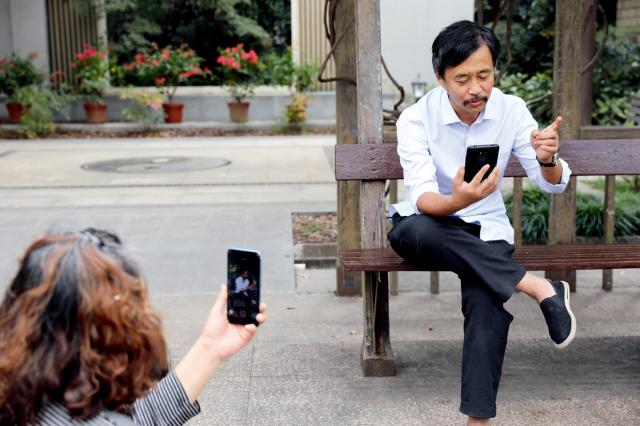Shen Wei, a philosophy-quoting literato living on the streets of Shanghai, became an online celebrity overnight for his classical learning and eloquence. But his meteoric rise to fame has left him literally searching for peace and quiet
Before the black Audi came to a complete stop, a thin dark-skinned arm reached out from its half-open window. It was met with a bouquet of outstretched hands from a long-waiting crowd. A forest of cameras on tripods recorded everything.
Shen Wei slowly emerged from the car with the air of an eminent leader. Soon, he was surrounded by fans. Shen took time to greet each of them.
One fan presented a scroll painting of Guan Yu (162-219), the red-faced, long-bearded military general of the late Eastern Han Dynasty (25-220).
“The painting is of Guan reading by candlelight,” Shen said. “The book is definitely Chunqiu (one of the core Chinese classics). It’s a classic depiction of Guan, which shows he is a man of righteousness,” he explained. The crowd reacted in amazement. Once again, Shen had lived up to his reputation.
Surrounded by a crowd, 52-year-old Shen headed toward West Gaoke Road, the place where the internet first came to know Shen.
Shen had been wandering the streets of Shanghai for 17 years. He scavenged through trash and survived on discarded food. In the summers, he slept on the grass. He spent his winter nights under bridges.
But in early March, things drastically changed for Shen. Videos of him expounding articulately on Chinese literary classics went viral. He immediately captured the public imagination.
It wasn’t long before netizens dug into his past. Shen came from a family of intellectuals. He had not only gone to university, but also worked as a civil servant for the city.
His unique origins helped the videos garner millions of views.
Shen is a modern-day wandering philosopher. Fans call him a master of guoxue (traditional Chinese culture). His family thinks he’s mentally ill. But to the many livestreamers and online vendors looking to cash in on his fame, Shen is a sure bet.
‘Vagabond Master’
For nearly two decades, Shen Wei’s day began at nightfall. Around 6pm, restaurants, supermarkets and apartment buildings throw out their daily trash.
Shen would wander between West Gaoke Road and Pusan Road, scrounging through each garbage can for leftovers, plastic bottles and scrap cardboard. He ate the food he found, exchanged the empty bottles for cash and kept the cardboard to practice his calligraphy. After sorting his haul, he would buy a newspaper at a newsstand. On rainy days, he would sleep under the awning of a nursing home.
TikTok user “Baihecake” was the first livestreamer to discover Shen. In December 2018, he saw a ragged-looking Shen engrossed in a book under a streetlight. To his surprise, the book was Shangshu – one of the Five Classics of Chinese antiquity. They started chatting, and Shen showed he was articulate and well read.
In Baihecake’s uploaded clip, Shen is sitting on the roadside, ragged and unkempt, his wild locks glued to his face. He quotes passages from the classical Chinese canon with books and newspapers strewn across his lap. There is a large red bucket stuffed with empty plastic bottles at his feet, and a pile of black trash bags behind him.
Shen excels at relating ancient quotes and wisdom to modern life. In his first video, Shen quotes Wei Zheng (508-643), one of the most celebrated officials of the Tang Dynasty (618-907): “Many people get off to a good start, but few persevere to the end.” He then explains how the quote applies to many situations people face today, including friendships.
The stark contrast between Shen’s eloquence with his appearance and past of living rough has resonated on social media, where he is dubbed the “vagabond master.”
Since his first appearance in March, clips of Shanghai’s street guru have flooded short video apps, and their creators are cleaning up.
Shen’s fans are mostly middle-aged and elderly. In just one month, they showered him with around 300,000 yuan (US$42,670) in rewards. Shen once received 50,000 yuan (US$7,111) in less than two hours.
Fans idealize Shen as a wise, underprivileged hermit. Some had spun him even more tragic origin stories. As one popular yarn goes, Shen was a top student at Shanghai’s prestigious Fudan University before having a mental breakdown after his wife and daughter died in a car accident.
“Me? A Fudan graduate? Fudan was way out of my league,” Shen said in an interview with Red Star News. “I’ve never been married, so how could I have a daughter?”
No Ascetic Choice
Shen had a rough childhood. His father was first mate on a cargo ship and had a violent temper. His mother, who taught at a local college, bore the brunt of it.
Growing up in this troubled home, Shen saw reading as his only escape. He would save his breakfast money to buy books.
One day, his grandmother who lived with them, asked Shen to collect a piece of broken glass and sell it for money. He realized that trash could be turned into cash. To buy more books, Shen would scan the streets for discarded items. He collected everything from scrap metal and copper to bottles, orange peels and pork bones.
At the time, Shanghai had few sanitation workers but plenty of salvage dealers. The young boy saw the city’s streets as fields of gold.
His father hated the history books and painting that Shen so loved, and instead pressured him to study auditing at a local university. Shen still regrets the decision. After graduating in 1986, Shen worked for the Xuhui District audit bureau.
“If I had a chance to start again, I would have found a job dealing in culture, not numbers,” Shen said.
He earned roughly 100 yuan (US$14) per month, most of which he spent on books: the complete works of Shakespeare, the anthologies of ancient Chinese intellectuals, and the 10-volume The Records of the Grand Historian, a history of ancient China before 94 BC written by Han Dynasty official Sima Qian (145-86 BCE).
But Shen kept scavenging. Every afternoon after work, Shen would secretively scrounge through the recyclables from the bins outside his five-story office building. In 1993, Shen’s boss discovered his habit and drove him out of work.
After that, Shen’s family sent him for a psychiatric evaluation. “I told them that sending me to the psychiatric hospital wouldn’t change me at all. [Picking through garbage] is an act of free will, not my mental condition,” Shen told our reporter.
“At the hospital, my father asked me to go with him to get the test results. I followed him through several metal doors, and when we reached the final door, suddenly I was locked inside. People in the room grabbed me and forced me to put on hospital clothes. When I looked back, I saw my parents coldly standing there with no expression on their faces. That scene is deeply etched in my memory,” he said.
Shen said he constantly felt humiliated at the hospital. “Nurses there didn’t take anything you said seriously. They seemed nice and would smile, but actually they treated you like a kid,” Shen told NewsChina.
But Shen was still scavenging. He was caught hoarding items left by a discharged patient under his bed. In his file, a nurse wrote: “He’s not improving, still picking up trash.” An attending psychiatrist diagnosed him with severe schizophrenia.
After three months, Shen made his escape. One day he told hospital staff he would attend his nephew’s wedding, walked through the doors and never went back.
Shen rented a small room, and in 2000, moved in with his mother. She and Shen’s father had already divorced.
Shen kept five dogs and three cats in his room, which was already packed with piles of newspapers, books and trash he had collected. Neighbors started complaining about the smell.
“The place was full of garbage. You could find it everywhere, even in the refrigerator, microwave and washing machine. He was living and sleeping surrounded by trash,” Shen’s mother told NewsChina.
“Neighbors complained and called the police. The neighborhood committee came and had some people clear out all his garbage. We certainly agreed. He was disturbing other people. But he was angry at us for not taking his side,” she said.
After their falling out, Shen gradually drifted to the streets where he could contribute to collect trash. He says the life suits him. “I can fall asleep instantly when I lie down on the street. Finding things to eat isn’t a problem at all. Food is the easiest thing to scavenge for. It’s the most wasted and under-appreciated thing in today’s society. I only pick up food that suits my appetite, mostly vegetarian stuff. I would also save some to feed dogs, cats and fish.”

Shen Wei looks at a painting from his fans, October 15, 2019

Shen Wei communicates with his fans in a livestreaming session, October 15, 2019

Shen Wei and his fans, October 15, 2019
Livestream in Peace
Shen was internet famous, but not capitalizing on it. To savvy livestreamers and social media influencers, he was an unclaimed gold mine.
They flocked to Shen’s regular haunts seeking selfies. On camera, young women declared their love and willingness to marry him. Young men asked Shen to adopt them as sons.
After livestreaming Shen, two brothers who lived nearby received more than 10,000 yuan (US$1,422) in rewards in one day. A local fruit seller known on TikTok as “Miss Fruits” uploaded several clips of Shen. She gained 9,000 followers overnight. “We’d run across Master Shen often and always thought there was something wrong with his mind. We never imagined he’s actually a learned man,” she told NewsChina.
“Anyone who can access and film [Shen] can get popular and easily gain lots of followers,” said an employee at short-video app Kwai who requested anonymity.
More than 10 people, most of them livestreamers from around Shanghai, follow Shen every day.
Shen expressed his frustration over the invasion of privacy. “I’m standing there. I don’t care how they would like to film me to make money. Honestly, I can’t do anything about it. They don’t even give me the slightest respect,” Shen told the Beijing News on March 22.
On March 25, Shen had enough. He posted a note at his usual spot on West Gaoke Road saying that he needed a break. He washed, shaved, cut his hair and went to the nearby police station to get an ID. Two weeks later, he opened his own Kwai account, and now has more than one million fans that follow his adventures.
Shen livestreams what he calls “advanced wandering.” At the invitation of fans, Shen has traveled across the country, from East China’s Zhejiang Province to Xinjiang Uyghur Autonomous Region. In his videos, Shen visits museums, bookstores and historical and cultural spots, while imparting his viewers with insight and bits of background knowledge.
Shen has turned down offers from five agencies looking to sign him for endorsements. He also rejected an unusual offer from an educational institution in Xi’an, Shaanxi Province that wanted him to stand on stage in front of students without saying a word.
Despite his sudden rise to fame, Shen still says he’s the same – a person with a passion for knowledge who seeks to live a simpler life. He is an admirer of Mahatma Gandhi, and keeps photos of him in his second-hand phone. “I elect to lead an ascetic life. That’s the lifestyle I choose for myself,” Shen said.
“All these years, the one principle I’ve held to is refrain from careless waste.”

 Old Version
Old Version


